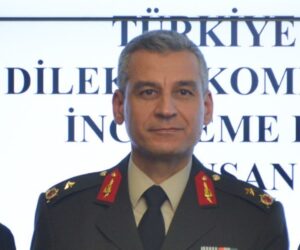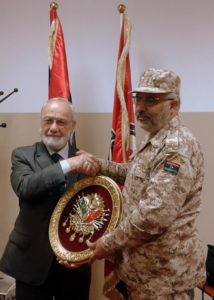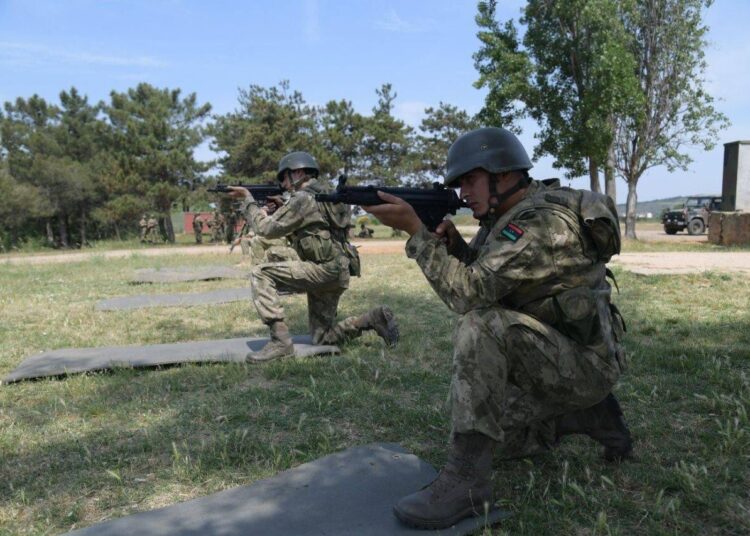Abdullah Bozkurt/Stockholm
Turkey has increasingly favored comprehensive framework agreements with other nations to obscure subsequent deals in military, defense and intelligence matters from public scrutiny.
This tactic by President Recep Tayyip Erdogan’s government was disclosed on May 21, 2024 by Brig. Gen. Esat Mahmut Yılmaz, head of the General Directorate of Legal Services at the Defense Ministry.
In a closed session with lawmakers from the Foreign Affairs Committee, Yılmaz explained that Turkey has consolidated the three agreements, which were previously negotiated separately, into a single comprehensive framework deal. This strategic move aims to expedite Turkey’s engagement in military, defense and intelligence matters in foreign territories.
Once ratified by the Turkish Parliament and enacted into law with the president’s signature and publication in the Official Registry, such a framework agreement allows the Turkish military to enter into secondary deals with foreign partners without further parliamentary approval. This approach enables the Turkish military to keep the extent and scope of its operations in foreign countries away from public debate.
Until recently the Turkish military negotiated separate agreements with foreign partners on military training, defense industry cooperation and narrowly defined military framework cooperation. Now it is consolidating these into a single, wide-ranging framework agreement. This new approach, particularly aimed at partners in Africa, Eastern Europe and Asia, is designed to expedite Turkish military operations, reduce bureaucratic hurdles and conceal the specifics of secondary agreements from public scrutiny.
“Actually, we used to present these three separately as individual agreements to our parliament. …. However, later on, we combined all three. … We now negotiate these three agreements as much as possible under the title framework agreement and defense cooperation agreement,” Yılmaz said.
As of December 2023, following active engagement by Turkish defense and foreign ministry officials, Turkey had signed military framework agreements with 88 countries and military training cooperation agreements with 63. Negotiations for military framework agreements are ongoing with 47 countries, and discussions for training agreements are in progress with 13 countries. Additionally, Turkey has signed defense industry cooperation agreements with 90 countries.

Most international agreements handled by the Turkish Parliament in recent years pertain to such comprehensive framework agreements. Interestingly, the Foreign Affairs Committee, rather than the Defense Committee, often oversees the review and approval process. This is noteworthy given the Foreign Affairs Committee’s lack of expertise in military and defense matters, suggesting that the Erdogan government aims to prevent lawmakers from examining these agreements too closely.
President Erdogan’s personal interest in pursuing defense and military deals with foreign countries has been a significant driving factor in fast-tracking such agreements. His family profits substantially from the sale of military hardware, such as Bayraktar drones manufactured by Baykar, a company owned by his son-in-law, who has become billionaire thanks to government support.
Furthermore, the Erdogan family benefits indirectly through under-the-table commissions from defense contractors who receive generous government support, including no-contest bidding for government contracts, tax breaks and subsidies. Estimates suggest that the Erdogan family has amassed well over $100 billion over two decades through such corrupt schemes.
Minutes of the closed session of the parliamentary Foreign Affairs Committee on May 21:
Increased engagement with foreign partners in military affairs and the defense industry also enables the Erdogan government to advance political projects abroad. Deputy Foreign Minister Mehmet Kemal Bozay defended the approval of military deals with several African countries in the Foreign Affairs Committee, acknowledging that Turkey found it easier to leverage its counterparts on political objectives after finalizing military and defense agreements.
He cited examples of how they accomplished the closure of private schools operated by the Erdogan-critical Gülen group in Mauritania and Gambia; facilitated the removal of certain Armenian artifacts from the genocide museum in Rwanda; and advocated on behalf of the breakaway Turkish Republic of Northern Cyprus (KKTC), recognized only by Turkey, which maintains around 30,000 troops in the eastern Mediterranean island’s north.
As part of exporting political Islamist ideology abroad, Erdogan established the Maarif Foundation in 2014, staffing its management with known jihadist figures and allocating millions of dollars of taxpayer money. Its objective is to cultivate a new generation of Islamist political activists who rally around Erdogan and his worldview. Video footage has surfaced from Africa and other regions depicting students at Maarif schools chanting and praying for Erdogan during Turkish election campaigns or military operations in Syria.
The network of private schools established by the Gülen movement, inspired by US-based Turkish Islamic scholar Fethullah Gülen, has posed a significant obstacle to Erdogan’s initiatives. Gülen has been a prominent critic of President Erdogan and opposes the Turkish president’s manipulation of religion for political gain. Consequently, the Erdogan government has actively pressured foreign partners to close down these schools and replace them with institutions run by the Maarif Foundation.
The agreements also grant the Erdogan government the authority to deploy private military contractors abroad or utilize them as advisors in training centers established in Turkey for foreign troops. While the framework agreements do not explicitly mention this provision, it is cleverly obscured under the vague category of “other” areas of cooperation, skillfully inserted into certain sections of the text within military and defense cooperation agreements.

Private military contractor SADAT, an abbreviation of Uluslararası Savunma Danışmanlık İnşaat Sanayi ve Ticaret Anonim Şirketi, established by Erdogan’s former chief military advisor, retired Gen. Adnan Tanrıverdi, has managed to expand its presence in several countries in the Middle East and North Africa region, thanks to such agreements. Tanrıverdi hinted at SADAT’s ambitions to benefit from these agreements as early as 2014, saying, “Turkey has close social, economic and political relations with more than 35 Saharan and Sub-Saharan countries in Africa. [Turkey] carries out [military] activities with some of those countries in accordance with military training cooperation agreements.”
Facing mounting criticism for clandestine operations both within Turkey and abroad, SADAT is currently lobbying for the approval of new legislation that would explicitly permit private contractors to provide military training services.
The expansion of the scope and depth of military framework agreements serves as a significant indicator of the transformations underway in Turkey, where President Erdogan is increasingly prioritizing military and defense capabilities to project power in its neighboring regions and beyond.












